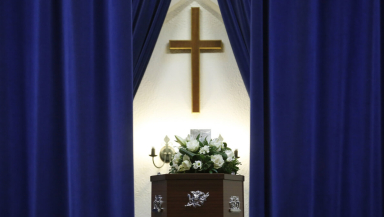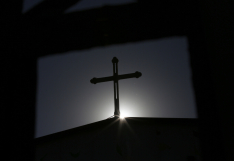
A cross has been removed from a crematorium in Lancashire for fear of offending non-religious visitors.
Accrington Crematorium in Burnley will now store its cross in a cupboard and will only bring it out when requested. The decision, which was made by the local Council, has sparked outrage in the local parish and from Christian groups around the country, including the Anglican Bishop of Burnley.
"At the census a majority of people in Lancashire identified as Christian and many arriving at the crematorium will want, and indeed expect, the cross to be there to offer them comfort," said Philip North.
"If it's a funeral of someone of another faith or none, remove the cross by all means, but have it in place for the majority who will still expect to see it.
"The cross is a powerful symbol of the victory of life over death. People living with grief need that kind of symbol. The rituals around death are incredibly important."
The cross had stood behind the altar at Hyndburn crematorium for half a century but was taken down when the room was painted and never put back up. After the £20,000 upgrade earlier this year, Hyndburn Council decided the status quo would be for the cross to be absent, unless otherwise requested.

"At Accrington Crematorium approximately 40 per cent of families state they have no religion and humanist services are very common now," Councillor Moss said, who is head of Hyndburn cemetries.
"Whilst this is a change at Accrington Crematorium, it is usual industry practice."
The director of the Christian Institute, a campaign group, joined Bishop North in ridiculing the decision.
"The cross was there because it is the Christian heritage of this country," said director Colin Hart. "That doesn't preclude others from having their own burials to the beliefs that they have.
"I don't know anybody who would be offended by this. It's the background of our country."
It is not just Christians who have criticised the move. Gurinder Josan, a spokesperson for the Sikh Council UK supported Hart's argument.
"I personally wouldn't be offended by this at all," said Josan.
"Most Sikhs appreciate the fact we live in a majority Christian country. We define ourselves as British in that context, so wouldn't be offended by the sight of the cross."














